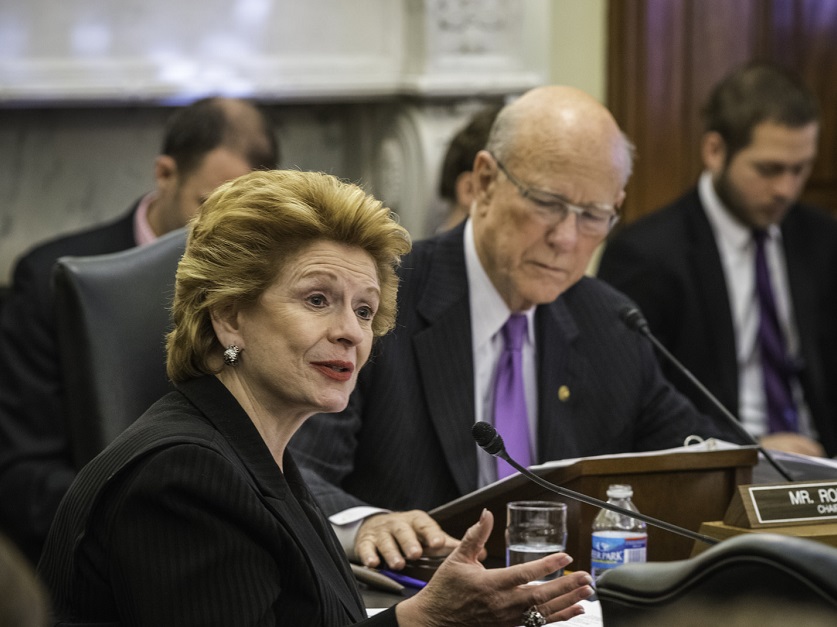Leaders of the Senate Agriculture Committee are working to protect their farm bill from floor amendments that could cut crop insurance or other key programs.
Chairman Pat Roberts, R-Kan., and ranking Democrat Debbie Stabenow of Michigan said Tuesday afternoon that they didn’t know how many amendments the Senate would ultimately be allowed to debate this week. Senate leaders are working together to get the bill passed before the week-long July 4 recess.
But an amendment that Roberts said will likely get a vote is a proposal by Sens. Richard Durbin, D-Ill., and Chuck Grassley, R-Iowa,, to impose a means test on crop insurance. Roberts and Stabenow are working together to defeat the proposal, which is similar to an amendment the Senate approved in 2013.
Durbin told Agri-Pulse he expected Senate leaders to require that the amendment get at least 60 votes to be adopted. The amendment would reduce premium subsidies by 15 percentage points for producers with adjusted gross incomes exceeding $700,000 per year, the same income limit in the bill for commodity programs. In 2013, Durbin partnered with Sen. Tom Coburn, R-Okla., to win approval, 59-33, of an amendment designed to reduce premium subsidies for producers with adjusted gross incomes over $750,000 per year.
“Means testing crop insurance is not a good idea. If you do that, the companies will make a decision to leave certain areas,” Roberts told reporters.
Grassley said he is cosponsoring the amendment for the same reason that he is pushing for a separate amendment that attempts to tighten eligibility rules for commodity programs. But his support for the amendment took many in the crop insurance industry by surprise.
“There’s nothing wrong with getting bigger, but we shouldn’t subsidize people to get bigger,” Grassley said.
Another amendment that will likely get a vote, Roberts said, is a proposal by Sen. John Thune, R-S.D., to ease restrictions on cutting hay and grazing livestock on land enrolled in the Conservation Reserve Program. Thune is not pursuing a vote on increasing the acreage cap on CRP. The bill would raise the current limit of 24 million acres to 25 million acres. The House-passed bill would increase the limit to 29 million acres.
Another amendment targeting crop insurance, sponsored by Jeanne Shaheen, D-N.H., and Jeff Flake, R-Ariz., would cap premium subsidies at $125,000 annually per producer.
Shaheen, joined by Pat Toomey, R-Pa., and others, also is sponsoring a bipartisan amendment to roll back the sugar program. In 2013, their amendment was defeated, 45-54. The House in May voted down an amendment targeting the sugar program, 137-278.
Among other amendments that have been filed:
- A proposal by Cory Booker, D-N.J., and Mike Lee, R-Utah, to impose new restrictions on commodity checkoff programs.
- An amendment by Thune and others to provide an hours-of-service exemption for livestock haulers and other agricultural shippers.
- A proposal by Tom Cotton, R-Ark., to expand work requirements in the Supplemental Nutrition Assistance Program to adults in their 50s, something the House bill would do.
- A proposal by Ron Johnson, R-Wis., to allow canned, dried, frozen and pureed fruit and vegetables to qualify for a fresh fruit and vegetable program for schools.
Senate Foreign Relations Chairman Bob Corker, R-Tenn., was pushing for an amendment to curb President Donald Trump's ability to impose tariffs under a national security provision of trade laws known as Section 232. Roberts said the issue would be considered separately by the Senate Finance Committee.
Senate Majority Leader Mitch McConnell, R-Ky., and Democratic leader Chuck Schumer of New York are both backing the bill. “My colleagues will have ample opportunity to consider the legislation before us,” McConnell said. “In a few days I hope they will join me in voting to pass it."
For more news, go to www.Agri-Pulse.com


